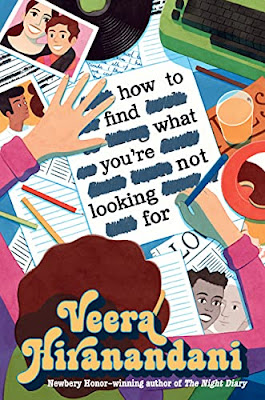Review: How to Find What You're Not Looking For
How to Find What You're Not Looking For
by Veera Hiranandani
Kokila (imprint of Penguin Random House)
Category: Middle Grade
Reviewer: Beth L. Gallego
You are nearly twelve years old, living in suburban Connecticut with
your parents and 18-year-old sister, Leah. You like reading Wonder Woman
comics, listening to Beatles records with Leah, and helping in your
parents’ bakery. School has always been difficult; writing is especially
hard, no matter how much you practice. You don’t think too much about
being one of very few Jewish families in the area, and you really don’t
think about your parents’ expectation that both you and Leah will one
day marry nice Jewish men. Then Leah falls in love with Raj, and you’re
not sure which part has your parents more upset, that he isn’t Jewish or
that he is Indian. After Leah and Raj elope, your parents won’t even
talk about it with you. You’re left trying to figure out who you are and
what you believe.
In this middle-grade historical novel, the second-person narration
effectively pushes the reader to confront the thorny questions Ariel
“Ari” Goldberg must think about. At school, she faces antisemitic
bullying from a classmate. At home, she learns about the racism that Raj
experiences. She is caught between her beloved older sister and their
parents, and then there is the stress of the family bakery’s financial
troubles and what might be an undiagnosed learning disability. The
tumultuous atmosphere of the late 1960s provides the backdrop to the
Goldberg family’s internal conflicts.
This is an outstanding addition to middle grade fiction and a strong
contender for the Sydney Taylor Book Award. Ari’s struggles with the changes
all around her are realistic and nuanced, perfectly suited to the
intended audience in both style and content. The Jewish experience is
shown to be multi-faceted and different ways of being Jewish are
represented: Ari’s maternal grandparents and extended family in Brooklyn
are very traditional and disappointed with Ari’s mother for marrying
someone less religiously observant; Ari’s father clearly treasures his
Jewish identity even as he must keep the bakery open on Saturdays rather
than closing for Shabbos; Leah has to think about what being both
Jewish and Indian will mean for her own child(ren).
In an author’s note, Hiranandani shares how her family history inspired
the story. Her father, an immigrant from India, and her mother, a Jewish
American woman from Brooklyn, are reflected in Raj and Leah. A biracial
woman from an interfaith family, Hiranandani has a fresh voice and a
unique perspective much needed in middle grade literature. Her sensitive
portrayal brings her characters to life in all their complicated glory.
Ari, Leah, their parents, Raj, and his parents all grapple with the the
same issues from different angles. There are no easy answers, but there
is a lot of love.
Are you interested in reviewing books for The Sydney Taylor Shmooze? Click here!



Comments
Post a Comment